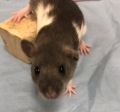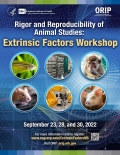

Enhance Rigor and Reproducibility in Animal Research by Managing Extrinsic Factors
When: September 23, 28, and 30, 2022
Venue: Zoom
Register: scgcorp.com/ExtrinsicFactorsWS
The workshop will be a forum to discuss the current status of and needs for understanding extrinsic environmental factors; their potential impact on animal research outcomes; and how facilities may optimally manage, monitor, and report these extrinsic factors in an effort to enhance reproducibility and rigor in animal research. The focus of this workshop will be on identifying gaps, opportunities, and new approaches in husbandry of commonly and widely used animal models; relevant environmental factors and conditions; and the need for novel instruments, equipment, and infrastructure for animal research core facilities (e.g., modern design of research core facilities, high-throughput equipment, telemetry for behavioral research).
Cryopreservation
Sperm cryopreservation requires submission of 2-3 males, preferably proven breeders, 10-26 weeks of age. You will receive frozen sperm aliquots in sterile CBS high-biosecurity straws.
Embryo cryopreservation requires submission of 8-10 males, preferably proven breeders, 10-26 weeks of age, and submission of 16-20 females at 7-12 weeks of age (mature) or ideally, 3-4 weeks of age (immature). You will receive all cryopreserved morula stage embryos from mature females or zygotes from immature females (~20 embryos per sterile CBS high-biosecurity straws), collected from the donor females you provide. Depending on reproductive characteristics of the strain/stock and the desired total number of embryos, multiple rounds of collection from additional females may be necessary.
Cryo-Resuscitation
Resuscitation via cryopreserved embryos requires submission of 40-60 cryopreserved embryos. You will receive all recovered pups of the appropriate genotypes (if genotyping is requested) after health monitoring has been performed.
Resuscitation via cryopreserved sperm will be performed by intracytoplasmic sperm injection. You will receive all recovered pups after genotyping (if requested) and health monitoring have been performed..
Rederivation
Rederivation to pathogen-free status via embryo transfer requires submission of 5 males, 10-26 weeks of age and 10 females, 7-12 weeks of age. You will receive all pups or pups of the appropriate genotypes (if genotyping is requested) following health monitoring.
Resuscitation and rederivation procedures are performed in pathogen-free barrier facility, and clean surrogate mothers purchased from commercial vendor are used for embryo transfers. You will receive the litters with confirmed genetics (if genotyping is requested) and pathogen-free health status.
Genotyping
Genotyping requires tail tip or sperm aliquot. Types of assays available include standard PCR, standard PCR followed by restriction digest or sequencing, RT-PCR, qPCR, High Resolution Melt (HRM) and probe-based allelic discrimination. Pricing depends on the specific type of assay performed.
Copy Number Determination: droplet digital (dd) PCR can be performed to determine copy number (e.g. transgene copy number).
Sex Determination: PCR-based assays to determine sex are available.
Genotyping assay development requires certain sequence information and a positive control sample. Please contact us to discuss.
Validation/optimization of a genotyping assay requires an assay protocol with primer information and a positive control sample.
Microsatellite Analysis
Low density microsatellite or SNP analysis is available for genotyping, strain identification or marker-assisted speed congenic approaches.
Cytogenetic Analysis
Giemsa staining on metaphase spreads prepared from cells for detection of aneuploidy.
Fluorescent in situ Hybridization with commercially available probes.
Spectral Karyotyping on metaphase spreads prepared from cells is available on a collaborative basis.
Rat Tissues
Tissue or organ sample collection from specific strains, preserved or fixed to your specifications. Cost includes euthanasia, necropsy and aseptic collection of one organ or tissue. Additional samples may be collected from the same animal for a set fee per organ or tissue.
Timed Pregnant Rats
Timed pregnant females are available for our live colony strains only. For each order, we mate hormonally synchronized females and ship at least 2 plug positive females. Successful pregnancies cannot be guaranteed.
Microbiota Characterization
The gut microbiota (GM) is now recognized as a key factor in health and disease. Differences in the composition of the gut microbiota of research animals may contribute to altered phenotypes or poor reproducibility of animal-based studies. Culture-independent techniques such as next-generation sequencing (NGS) allow in-depth characterization of the GM. The RRRC now offers a full line of NGS-related services including fecal DNA extraction, 16S rDNA gene sequencing, and informatics analysis to researchers using rat models. For more information, please see here or contact us.
16S rDNA gene sequencing requires submission of 1-2 fresh fecal samples per rat. Samples should be frozen immediately following collection and shipped frozen. You will receive a detailed report containing the relative abundance of all detected microbes at each taxonomic level, 2D and 3D principal component analyses, rarefaction curves, and the associated raw data. For more information, please see here.
